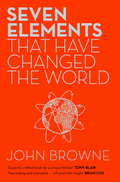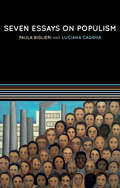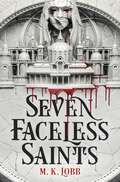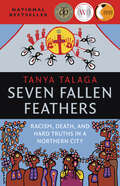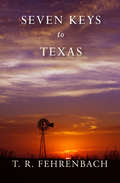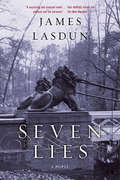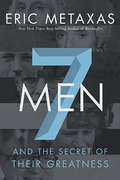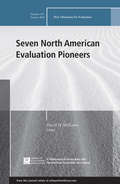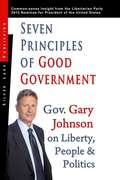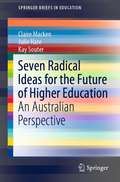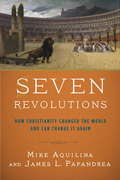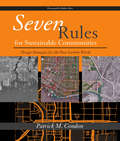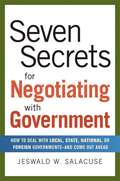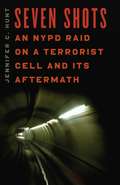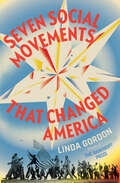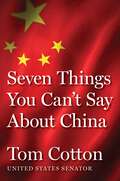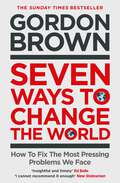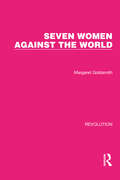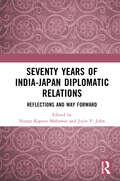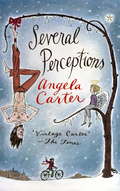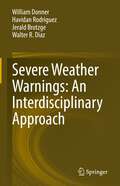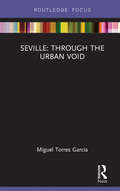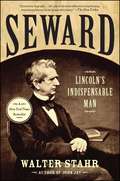- Table View
- List View
Seven Elements That Have Changed The World: Iron, Carbon, Gold, Silver, Uranium, Titanium, Silicon
by John Browne'Fascinating and enjoyable ... enthused with insight' - Brian CoxUranium, carbon, iron, titanium, gold, silver and silicon - former BP CEO John Browne explains how seven elements are shaping the 21st century, for good and for bad.Humans have put the Earth's resources to extraordinary use, but not always for the benefit of humankind. SEVEN ELEMENTS vividly describes how iron, carbon, gold, silver, uranium, titanium and silicon have shaped the world around us - for good and for bad.This book takes you on an adventure of human passion, ingenuity and discovery, but it is a journey that is far from over: we continue to find surprising new uses for each of these seven key elements. Discover how titanium pervades modern consumer society, how natural gas is transforming the global energy sector and how an innovative new form of carbon could be starting a technological revolution.SEVEN ELEMENTS is a unique mix of science, history and politics, interwoven with the author's extensive personal and professional experience.
Seven Elements That Have Changed The World: Iron, Carbon, Gold, Silver, Uranium, Titanium, Silicon
by John Browne'Fascinating and enjoyable ... enthused with insight' - Brian CoxUranium, carbon, iron, titanium, gold, silver and silicon - former BP CEO John Browne explains how seven elements are shaping the 21st century, for good and for bad.Humans have put the Earth's resources to extraordinary use, but not always for the benefit of humankind. SEVEN ELEMENTS vividly describes how iron, carbon, gold, silver, uranium, titanium and silicon have shaped the world around us - for good and for bad.This book takes you on an adventure of human passion, ingenuity and discovery, but it is a journey that is far from over: we continue to find surprising new uses for each of these seven key elements. Discover how titanium pervades modern consumer society, how natural gas is transforming the global energy sector and how an innovative new form of carbon could be starting a technological revolution.SEVEN ELEMENTS is a unique mix of science, history and politics, interwoven with the author's extensive personal and professional experience.
Seven Essays on Populism: For a Renewed Theoretical Perspective (Critical South)
by Paula Biglieri Luciana CadahiaThis important intervention interrogates keystone features of the dominant European theoretical landscape in the field of populism studies, advancing existing debates and introducing new avenues of thought, in conjunction with insights from the contemporary Latin American political experience and perspectives. In each essay – the title a nod to the influential socialist thinker José Carlos Mariátegui, from whom the authors draw inspiration – leading Argentine scholars Paula Biglieri and Luciana Cadahia pair key dimensions of populism with diverse themes such as modern-day feminism, militancy, and neoliberalism, in order to stimulate discussion surrounding the constitutive nature, goals, and potential of populist social movements. Biglieri and Cadahia are unafraid to court provocation in their frank assessment of populism as a force which could bring about essential emancipatory social change to confront emerging right-wing trends in policy and leadership. At the same time, this fresh interpretation of a much-maligned political articulation is balanced by their denunciation of right-aligned populisms and their failure to bring to bear a sustainable alternative to contemporary neo-authoritarian forms of neoliberalism. In their place, they articulate a populism which offers a viable means of mobilizing a response to hegemonic forms of neoliberal discourse and government.
Seven Faceless Saints
by M.K. LobbDiscover what&’s lurking in the shadows in this dark fantasy debut with a murder-mystery twist, perfect for fans of Leigh Bardugo and Kerri Maniscalco. In the city of Ombrazia, saints and their disciples rule with terrifying and unjust power, playing favorites while the unfavored struggle to survive. After her father&’s murder at the hands of the Ombrazian military, Rossana Lacertosa is willing to do whatever it takes to dismantle the corrupt system: tapping into her powers as a disciple of Patience, joining the rebellion, and facing the boy who broke her heart. As the youngest captain in the history of Palazzo security, Damian Venturi is expected to be ruthless and strong and to serve the saints with unquestioning devotion. But three years spent fighting in a never-ending war have left him with deeper scars than he wants to admit…and a fear of confronting the girl he left behind. Now a murderer stalks Ombrazia&’s citizens. As the body count climbs, the Palazzo is all too happy to look the other way—that is, until a disciple becomes the newest victim. With every lead turning into a dead end, Damian and Roz must team up to find the killer, even if it means digging up buried emotions. As they dive into the underbelly of Ombrazia, the pair will discover something more sinister—and far less holy. With darkness closing in and time running out, will they be able to save the city from an evil so powerful that it threatens to destroy everything in its path?
Seven Fallen Feathers: Racism, Death, and Hard Truths in a Northern City
by Tanya TalagaThe groundbreaking and multiple award-winning national bestseller work about systemic racism, education, the failure of the policing and justice systems, and Indigenous rights by Tanya Talaga.Over the span of eleven years, seven Indigenous high school students died in Thunder Bay, Ontario. They were hundreds of kilometres away from their families, forced to leave home because there was no adequate high school on their reserves. Five were found dead in the rivers surrounding Lake Superior, below a sacred Indigenous site. Using a sweeping narrative focusing on the lives of the students, award-winning author Tanya Talaga delves into the history of this northern city that has come to manifest Canada’s long struggle with human rights violations against Indigenous communities.
Seven Keys to Texas
by T. R. FehrenbachThe author of Lone Star: A History of Texas and the Texans explores the state&’s unique mindset and culture. Author T. R. Fehrenbach defines Texas as &“a state of mind.&” In The Seven Keys to Texas, he provides us with a seven-part framework for understanding this unique and ever-important state: its people, frontiers, land, economy, society, politics, and the change that has taken place and continues as Texas grows and develops. A must read for those who want to better understand Texas or create a vision for its future.
Seven Lies: A Novel
by James Lasdun"Superb. . . . Every page of this narration bears examples of Lasdun's own poetic mastery. . . . Shockingly vivid."--Time Out Part political thriller, part meditation on the nature of desire and betrayal, Seven Lies tells the story of Stefan Vogel, a young East German, whose yearnings for love, glory, and freedom express themselves in a lifelong fantasy of going to America. By a series of increasingly dangerous maneuvers, he makes this fantasy come true, his past seemingly locked behind the Berlin Wall and a new life of unbounded bliss ahead of him. But then his world begins to fall apart.
Seven Men: And the Secret of Their Greatness
by Eric MetaxasIn Seven Men, New York Times best-selling author Eric Metaxas presents seven exquisitely crafted short portraits of widely known-but not well understood-Christian men, each of whom uniquely showcases a commitment to live by certain virtues in the truth of the gospel. Written in a beautiful and engaging style, Seven Men addresses what it means (or should mean) to be a man today, at a time when media and popular culture present images of masculinity that are not the picture presented in Scripture and historic civil life. What does it take to be a true exemplar as a father, brother, husband, leader, coach, counselor, change agent, and wise man? What does it mean to stand for honesty, courage, and charity, especially at times when the culture and the world run counter to those values? Each of the seven biographies represents the life of a man who experienced the struggles and challenges to be strong in the face of forces and circumstances that would have destroyed the resolve of lesser men. Each of the seven men profiled-George Washington, William Wilberforce, Eric Liddell, Dietrich Bonhoeffer, Jackie Robinson, John Paul II, and Charles Colson-call the reader to a more elevated walk and lifestyle, one that embodies the gospel in the world around us.
Seven North American Evaluation Pioneers: New Directions for Evaluation, Number 150 (J-B PE Single Issue (Program) Evaluation)
by David D. WilliamsHow do people evaluate in daily life? This issue broaches this topic to better understand this dimension of being human, to develop evaluation theory, and to improve extraprofessional and professional evaluation practice. As part of a larger study addressing these issues in the lives of many professional evaluators around the world, case studies of seven early evaluation theorists and practitioners from North America were conducted. This issue contains articles with stories of some of their evaluation life experiences told and interpreted by these individuals, with commentary by an eighth evaluator. Themes that cross the cases are proposed, and responses by the individuals highlighted are shared in a final article. This is the 150th issue in the New Directions for Evaluation series from Jossey-Bass. It is an official publication of the American Evaluation Association.
Seven Principles of Good Government: Insights from the 2012 Libertarian Party Nominee for President
by Gary JohnsonGary Johnson is the former two-term governor of New Mexico. He made headlines during his tenure as governor for supporting school vouchers, a freeze on all taxes, real cuts in government agency funding and the decriminalization of marijuana. In 2012, he is running for President of the United States on the Libertarian Party ticket. He will be campaigning aggressively through the fall in all 50 states.
Seven Radical Ideas for the Future of Higher Education: An Australian Perspective (SpringerBriefs in Education)
by Claire Macken Julie Hare Kay SouterThis book focuses on the disruption of the tertiary higher education system as a result of societal changes occasioned by the Fourth Industrial Revolution and hastened by COVID-19. It takes the view that higher education is on an inevitable trajectory of disruption as a result of globalisation, technological disruption, and disaggregation of the formal education sector but that it must not lose sight of its central role in equipping current and future students for the new economy. The book takes a student-centric - and big-picture approach - examining some of the biggest challenges facing massified higher education systems. The authors consider ways to achieve modern, responsive and efficient higher education systems globally that are economically sound for governments and affordable for individuals.
Seven Revolutions
by Mike Aquilina James L. PapandreaCombining history, politics, and religion, Mike Aquilina and Jim Papandrea provide practical lessons to be learned from the struggles of the Early Church, lessons that can be applied to the day-to-day lives of Christian readers. Prolonged, multiple wars in the Middle East. Waves of immigrants crossing the borders. Ongoing economic recession. Increasing political polarization, often with religious overtones. Conflicts over ideologies that pit the progressive against the traditional. Sound familiar? These conditions not only describe the United States, but the situation of the Roman Empire in the third century. That situation led to religious persecution and the eventual collapse of the empire. In the middle of the third century, the Roman Empire was roughly the same age as the United States is now. In this book, authors Mike Aquilina and Jim Papandrea examine the practices of the Early Church--a body of Christians living in Rome--and show how the lessons learned from these ancient Christians can apply to Christians living in the United States today. The book moves from the Christian individual, to the family, the church and the world, explaining how the situation of the Early Church is not only familiar to modern Christian readers, but that its values are still relevant
Seven Rules for Sustainable Communities: Design Strategies for the Post Carbon World
by Robert Yaro Patrick M. CondonQuestions of how to green the North American economy, create a green energy and transportation infrastructure, and halt the deadly increase in greenhouse gas buildup dominate our daily news. Related questions of how the design of cities can impact these challenges dominate the thoughts of urban planners and designers across the U.S. and Canada. With admirable clarity, Patrick Condon discusses transportation, housing equity, job distribution, economic development, and ecological systems issues and synthesizes his knowledge and research into a simple-to-understand set of urban design rules that can, if followed, help save the planet.No other book so clearly connects the form of our cities to their ecological, economic, and social consequences. No other book takes on this breadth of complex and contentious issues and distills them down to such convincing and practical solutions. And no other book so vividly compares and contrasts the differing experiences of U.S. and Canadian cities.Of particular new importance is how city form affects the production of planet-warming greenhouse gases. The author explains this relationship in an accessible way, and goes on to show how conforming to seven simple rules for community design could literally do a world of good. Each chapter in the book explains one rule in depth, adding a wealth of research to support each claim. If widely used, Condon argues, these rules would lead to a much more livable world for future generations--a world that is not unlike the better parts of our own.
Seven Secrets for Negotiating with Government: How to Deal with Local, State, National, or Foreign Governments--and Come Out Ahead
by Jeswald SalacuseAlmost everyone has faced the frustrating task of negotiating with government-local, state, national, or foreign-at some point in their lives. Whether they are applying for a building permit from their local zoning board, trying to sell software to the U.S. Defense Department, looking for approval for a merger, or planning to set up a business in Limerick or Bangalore, businesspeople confront a unique set of challenges when dealing with any form of government. Distinguished author, professor and negotiation expert Jeswald W. Salacuse explains the ways in which negotiating with government is very different from private negotiation. In Seven Secrets for Negotiating with Government, he addresses the key variables involved-from the influence of bureaucracy to the perception of power on the government side of the negotiating table. The only book of its kind, this invaluable guide offers succinct, realistic, and accessible advice to help readers recognize the often-hidden interests driving government negotiators and how to use that knowledge to their advantage. Filled with real-life examples, this book will show businesspeople everywhere how to navigate this complex world and win.
Seven Shots: An NYPD Raid On A Terrorist Cell And Its Aftermath
by Jennifer C. HuntOn July 31, 1997, a six-man Emergency Service team from the NYPD raided a terrorist cell in Brooklyn and narrowly prevented a suicide bombing of the New York subway that would have cost hundreds, possibly thousands of lives. Seven Shots tells the dramatic story of that raid, the painstaking police work involved, and its paradoxical aftermath, which drew the officers into a conflict with other rank-and-file police and publicity-hungry top brass. Jennifer C. Hunt draws on her personal knowledge of the NYPD and a network of police contacts extending from cop to four-star chief, to trace the experience of three officers on the Emergency Service entry team and the two bomb squad detectives who dismantled the live device. She follows their lives for five years, from that near-fatal day in 1997, through their encounters inside the brutal world of departmental politics, and on to 9/11, when they once again put their lives at risk in the fight against terrorism, racing inside the burning towers and sorting through the ash, debris, and body parts. Throughout this fast paced narrative, Hunt maintains a strikingly fine-grained, street-level view, allowing us to understand the cops on their own terms—and often in their own words. The result is a compelling insider’s picture of the human beings who work in two elite units in the NYPD and the moral and physical danger and courage involved. As gripping as an Ed McBain novel—and just as steeped in New York cop culture and personalities—Seven Shots takes readers on an unforgettable journey behind the shield and into the hearts of New York City police.
Seven Social Movements That Changed America
by Linda GordonA brilliantly conceived and provocative work from an award-winning historian that examines how seven twentieth-century social movements transformed America. How do social movements arise, wield power, and bring about meaningful change? Renowned scholar Linda Gordon investigates these and other salient questions in this “visionary, cautionary, timely, and utterly necessary book” (Nicole Eustace), narrating how some of America’s most influential twentieth-century social movements transformed the nation. Beginning with the turn-of-the century settlement house movement, the book compares Chicago’s celebrated Hull-House, begun by privileged women, to a much less well known African American project, Cleveland’s Phillis Wheatley House, begun by a former sharecropper. Expanding her highly praised book The Second Coming of the KKK, the second chapter shows how a northern Klan became a mass movement in the 1920s. Contrary to what many Klan opponents thought, this KKK was a middle-class organization, its members primarily urban and well educated. In the 1930s, the KKK gave birth to dozens of American fascist groups—small but extremely violent. Profiles of two other 1930s movements follow: the Townsend campaign for old-age insurance, named for its charismatic leader, Dr. Francis Townsend. It created the public pressure that brought us Social Security, which was considered radical at the time, as was the movement to bring about federal unemployment aid for millions. Proceeding to the 1955–1956 Montgomery bus boycott—which jump-started the career of Martin Luther King, Jr.—the narrative shows how the city’s entire Black population refused to ride segregated buses; initiated by Black women, their years-long, hard-fought victory inspired the civil rights movement. Gordon then examines the 1970s farmworkers struggle, led by Cesar Chavez and made possible by the work of tens of thousands of the primarily Mexican American farmworkers. Together they built the United Farm Workers Union, winning better wages and working conditions for some of the country’s poorest workers. The book concludes with the dramatic stories of two Boston socialist feminist groups, Bread and Roses and the Combahee River Collective, which influenced the whole women’s liberation movement. Throughout the work, Gordon concentrates not on ideologies but on how millions of grassroots activists strategized and changed the United States. Separately and together, these seven narratives bring to life the creativity and hard work of social movements, and in doing so reveal how they have been central to American history, in stories that reverberate with today’s political activism.
Seven Things You Can't Say About China
by Tom CottonSenator Tom Cotton offers an unflinching look at the deadly threat of Communist China and reveals the truth about America’s most dangerous enemy. <p> “As a member of the Senate Intelligence Committee, I’m often asked if the threat from China is as bad as it seems. My answer is no—it’s worse than you can imagine.” <p> Seven Things You Can’t Say About China is Tom Cotton’s provocative exposé about the gravest threat to American freedom. The media, Hollywood, academia, Wall Street, and most politicians can’t—or won’t—speak the truth about China. But Senator Cotton will, because America needs to know. In this hard-hitting book, he reveals what others refuse to say, including: The inside story—drawn from his intelligence and national-security experience and knowledge—on how deeply the Chinese Communist Party has infiltrated America. How China persecutes Christians and commits genocide against religious and ethnic minorities. The alarming rise of China’s armed forces and nuclear arsenal, which will soon rival our own. The danger our children face from China’s influence on Hollywood, the NBA, TikTok, and so much more. How China lied, stole, and cheated its way to wealth while devastating America’s workers and businesses. <p> Seven Things You Can’t Say About China sounds the alarm about Communist China’s carefully crafted plans to defeat America in the coming decade—and what we must do to fight back. <b>New York Times Bestseller</b>
Seven Ways to Change the World: How To Fix The Most Pressing Problems We Face
by Gordon BrownTHE SUNDAY TIMES TOP TEN BESTSELLER 'His vision, ideas and passion shine through on every page' Ed Balls'Compelling, challenging, inspiring and very timely' Piers Morgan'Immensely powerful and persuasive...I found it exhilarating throughout' Joanna LumleyWhen the Covid-19 pandemic swept across the globe in 2020, it created an unprecedented impact. But out of such disruption can come a new way of thinking, and in this superb book, updated to include the latest events in Ukraine and at COP26, former UK prime minister Gordon Brown offers his solutions to the challenges we face now and in the future. In the book, he states that there are seven major global problems we must address: global health; climate change and environmental damage; nuclear proliferation; global financial instability; the humanitarian crisis and global poverty; the barriers to education and opportunity; and global inequality and its biggest manifestation, global tax havens. Each one presents an immense challenge that requires an urgent global response and solution. All should be on the world&’s agenda today. None can be solved by one nation acting on its own, but all can be addressed if we work together as a global community. However, Brown remains optimistic that, despite the many obstacles in our way, we will find a path to regeneration via a new era of global order. Yes, there is a crisis of globalisation, but we are beginning to see the means by which it might be resolved. Crises create opportunities and having two at once shouldn&’t just focus the mind, it might even be seen as giving greater grounds for hope. In Seven Ways to Change the World, Brown provides an authoritative and inspirational pathway to a better future that is essential reading for policy makers and concerned citizens alike.
Seven Women Against the World (Routledge Library Editions: Revolution #29)
by Margaret GoldsmithThis book, first published in 1935, examines the lives of seven revolutionary women: Charlotte Corday, Théroigne de Méricourt, Flora Tristan, Louise Michel, Vera Figner, Emma Goldman and Rosa Luxemburg. The revolutionary impulses of these remarkable women emerge as the natural result of the historical associations of their age, but the author concludes that some sacrifices were made in vain because there was no strong revolutionary movement behind them. This book is a key analysis of the reasons behind the revolt of these women against their systems of society, and why some of them thought it worth while to die if necessary for the principles in which they believed.
Seventy Years of India-Japan Diplomatic Relations: Reflections and Way Forward
by Nutan Kapoor Mahawar Jojin V. JohnSpanning seven decades, the diplomatic relations between India and Japan present a narrative of mutual respect, strategic alignment, and cooperation. This relationship has evolved from strong cultural and civilizational linkages to a global partnership and has led to significant developments in defence and security, economic modernization, infrastructure projects and regional cooperation in the Indo-Pacific.Based on a conference organized by the Indian Council of World Affairs (ICWA) on May 19, 2022, this book discusses the nature of India–Japan relationship and presents a comprehensive account of the diplomatic ties between the two nations. Attended by renowned scholars and policymakers, the conference marked the 70th anniversary of India-Japan relations and provided a fertile ground for insightful reflections, which have been collated in this book. It serves as a testament to the resilient relationship and an inspiring guide for the path ahead.Print edition not for sale in South Asia (India, Sri Lanka, Nepal, Bangladesh, Pakistan and Bhutan)
Several Perceptions (Virago Modern Classics #75)
by Angela CarterCentre stage in Angela Carter's unruly tale of the Flower Power Generation is Joseph - a decadent, disorientated rebel without a cause. A self-styled nihilist whose girlfriend has abandoned him, Joseph has decided to give up existing. But his concerned friends and neighbours have other plans.In an effort to join in the spirit of protest which motivates his contemporaries, Joseph frees a badger from the local zoo; sends a turd airmail to the President of the United States; falls in love with the mother of his best friend; and, accompanied by the strains of an old man's violin, celebrates Christmas Eve in a bewildering state of sexual discovery. But has he found the Meaning of Life?
Severe Weather Warnings: An Interdisciplinary Approach
by William Donner Havidan Rodriguez Jerald Brotzge Walter R. DiazThis book offers a comprehensive description and analysis of natural hazard warnings, drawing on perspectives from the social sciences, physical sciences, and interdisciplinary fields such as disaster studies to articulate a distinction between traditional warnings and what might be called interdisciplinary warnings. Traditional warnings approach warning technology, design, and application from a principally scientific and technical perspective. Human factors, while considered, often are of secondary concern. Interdisciplinary warnings, on the other hand, maintain a critical emphasis on the technical merits of warning systems, but also ask, “Will psychological and community factors such as culture and structure shape how the system is used, and, if so, can this information be incorporated into system design preemptively to make it more effective?” Given the absence of systematic work on interdisciplinary warnings, a book-length monograph discussing and synthesizing knowledge from the various fields focused on warnings and warning response is of critical importance to both academics and practitioners. Broadly conceived, the book presents readers with an in-depth overview of warnings, interdisciplinary research, and interdisciplinary collaboration. The book holds appeal for a very broad audience: scholars; practitioners; and academic, vocational, and technical instructors both in University and non-University settings. It is of interest to academic scholars due to the interdisciplinary treatment of warnings as well as the general presentation of up-to-date scholarship on warning theory. Additionally, scholars interested in interdisciplinary work in general and those focusing on disaster warnings find within the volume a framework for developing collaborative research partnerships with those from other disciplines. As well, the book offers practitioners --emergency managers, mitigation specialists, planners, etc. --a more comprehensive perspective on emergency response in practice, allowing for better development and application of warning policy. Finally, the book appeals to instructors both inside and outside the academy. The authors envision the book useful to professors teaching both graduate and undergraduate-level courses in Sociology of Disaster, Emergency Management Planning, Homeland Security, Disaster Response, Disaster Mitigation, and Business Continuity and Crisis Management. A robust market also exists among professional organizations, perhaps most notably FEMA, which offers countless online and in-person training courses via the National Training Program, Emergency Management Institute (EMI), and other venues.
Seville: Through the Urban Void (Built Environment City Studies)
by Miguel TorresRecent years have seen a growing interest in undetermined and unqualified urban spaces. Understanding cities as spaces for encounter, conflict and otherness, this book argues that this indeterminacy is not marginal but a key characteristic of urban space, and degrees of liberty foster change, creativity, and political action. The urban void is a conceptual construct that aims to render a principle of absence apprehensible, and to describe how it intervenes in place-making in the city. Seville: Through the Urban Void build mostly upon Henri Lefebvre’s work using concepts drawn on the social sciences, in order to articulate a biographic narrative of the Alameda de Hércules in Seville, Spain, which stands both as an outstanding instance of urban space and a very influential urban type. During its long historical span the Alameda has undergone alternating periods of decline and development, revealing the relations between successive urban paradigms and ideas of nature, territory, and the people. For the first time its whole history is told in a single account, which adds new perspectives to its understanding, and brings forward formerly disregarded aspects. This book shows how its liminal nature, which stubbornly persists over time, creates the conditions for creative processes.
Seville: Through the Urban Void (Built Environment City Studies)
by Miguel TorresRecent years have seen a growing interest in undetermined and unqualified urban spaces. Understanding cities as spaces for encounter, conflict and otherness, this book argues that this indeterminacy is not marginal but a key characteristic of urban space, and degrees of liberty foster change, creativity, and political action. The urban void is a conceptual construct that aims to render a principle of absence apprehensible, and to describe how it intervenes in place-making in the city.Seville: Through the Urban Void build mostly upon Henri Lefebvre’s work using concepts drawn on the social sciences, in order to articulate a biographic narrative of the Alameda de Hércules in Seville, Spain, which stands both as an outstanding instance of urban space and a very influential urban type. During its long historical span the Alameda has undergone alternating periods of decline and development, revealing the relations between successive urban paradigms and ideas of nature, territory, and the people. For the first time its whole history is told in a single account, which adds new perspectives to its understanding, and brings forward formerly disregarded aspects. This book shows how its liminal nature, which stubbornly persists over time, creates the conditions for creative processes.
Seward: Lincoln's Indispensable Man
by Walter StahrFrom one of our most acclaimed new biographers– the first full life of the leader of Lincoln’s “team of rivals” to appear in more than forty years. William Henry Seward was one of the most important Americans of the nineteenth century. Progressive governor of New York and outspoken U.S. senator, he was the odds-on favorite to win the 1860 Republican nomination for president. As secretary of state and Lincoln’s closest adviser during the Civil War, Seward not only managed foreign affairs but had a substantial role in military, political, and personnel matters.Some of Lincoln’s critics even saw Seward, erroneously, as the power behind the throne; this is why John Wilkes Booth and his colleagues attempted to kill Seward as well as Lincoln. Seward survived the assassin’s attack, continued as secretary of state, and emerged as a staunch supporter of President Andrew Johnson, Lincoln’s controversial successor. Through his purchase of Alaska (“Seward’s Folly”), and his groundwork for the purchase of the Canal Zone and other territory, Seward set America on course to become a world empire.Seward was not only important, he was fascinating. Most nights this well-known raconteur with unruly hair and untidy clothes would gather diplomats, soldiers, politicians, or actors around his table to enjoy a cigar, a drink, and a good story. Drawing on hundreds of sources not available to or neglected by previous biographers, Walter Stahr sheds new light on this complex and central figure, as well as on pivotal events of the Civil War and its aftermath.
